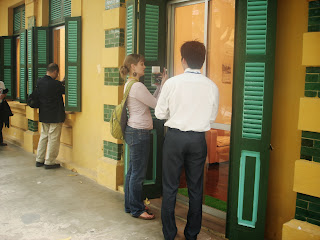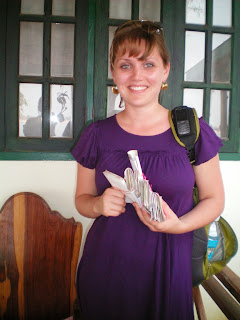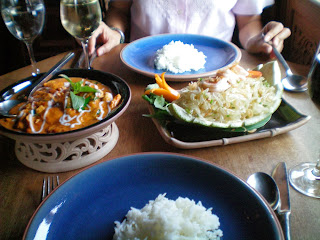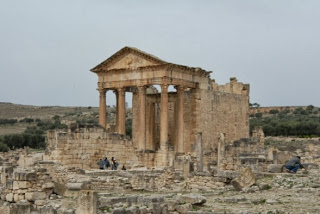On Monday the 24th, we headed to the Pakse airport as a group. We
paid our hefty excess baggage fees, and boarded the tiny plane packed
with plastic bags and fidgety passengers. Upon our arrival in
Vientiane, we stored our myriad bags and took advantage of Lao
Aviation's policy of not checking you through on multi-leg journeys to
head into Vientiane Center. Now, it may seem silly, but we found an
Italian restaurant...we should have eaten at someplace Lao, but after 3
weeks of rural Laotian food, we were all craving dairy and pasta and
real salad. So we opted instead to be really touristy.
Afterwards, Kecia and I walked the few blocks to Wat Sisaket, a
beautiful temple built out of wood in the 18th century. Looking at it,
you'd never believe the temple is that young - it is incredibly striking
and looks very old. You could see, too, the shift as we went farther
north - the wat became more Chinese, more Mongolian. We returned to the airport soon after, and then continued
on to Bangkok.
The next morning, I headed out to the airport, and
caught my flight to Hanoi. Upon landing in Hanoi, the sky was grey, and
the ground green - I was moving away from the equator. Noibai is quite
a ways from Hanoi, so the ride took a while. By the time I got to my
hotel, it was already 2p, and I called one of our participants, Cuong,
to let him know I had arrived. At the workshop, when I told the
Vietnamese that I was coming to Hanoi, they immediately started planning
my visit. Cuong, whose English was strongest, was nominated to be the
tour guide. So, sure enough, he showed up at my hotel on his moped and
we departed in a taxi (it's a status thing) to visit the Ho Chi Minh
Mausoleum. Yeah, commie dictators like to be embalmed, so one can
actually visit Bac Ho (Uncle Ho) in the flesh. I tried to deter Cuong,
but to no avail. Luckily, when we arrived, the mausoleum was closed for
the afternoon for some random Vietnamese bureaucratic reason, so I was
spared the viewing. However, Cuong informed me that I must come back to
Vietnam to see Uncle Ho, and perhaps worrying that I did not have a
great enough appreciation for Uncle Ho, promptly ordered us a tour guide
for the Presidential Palace. It was odd to listen to the tour guide's
canned speech about how humble Uncle Ho was, how he loved children (but
was never blessed with his own), listening to the radio, and tuberoses
with such reverence. At one point, the tour guide said something about
Uncle Ho and the enemy and then corrected his speech, apologizing if he
had offended me as an American.
After the failed mausoleum visit (thankfully), Cuong took me to the
Temple of Literature, which turned out to be one of my favorite places
in the entire world. And yes, I realize how nerdy that is. The Temple
of Literature is a Chinese-style series of pagodas, and was built
centuries ago by Vietnamese kings to honor learning and wisdom (what a
novel concept for a culture to appreciate!). In the 1400s, one of the
kings decided that the names of talented and wise men should live on, so
he inscribed the names of those who earned PhDs on stone stelae,
carried on the backs of tortoises, which are symbols of longevity in
Vietnam. Some 1300 men passed the exams, and are immortalized in stone
in the temple. The Temple of Literature is also the site of the first
university in Hanoi, although it was later moved. Students come to the
temple to pray for good luck on tests, and new grads swarm the
courtyards after graduation ceremonies, coming to be photographed and
thank Buddha for success. It is also a beautiful place, and quiet -
Hanoi's streets are filled with mopeds that honk continuously, so any
peace is appreciated.
Cuong also provided some interesting tidbits on Vietnam during our
day's stroll. I noted that all the moped drivers were wearing helmets
(not so in Laos) and he informed me that a law enforcing helmet use was
enacted this past December. And the people are obedient. Even when it
comes to regulating the number of children each family has - by law,
families are allowed only two children. According to Cuong, if you have
more children than 2, it will be very difficult for you in your
career. He added that rural families often had more, but for those who
worked in the city in this communist country, you can really only have 2
or you'll never be promoted - you'll be a "bad" party member in a
country where your status with the party determines your future.
The Old Quarter of Hanoi is really picturesque and bustling, with
"tube houses." There used to be a law calculating property tax by the
width of your storefront - so storeowners would make their storefronts 2
ft wide - and then the store would continue far into the back of the
building. So, there are many many houses that are short in width but
very deep, a vestige of this colonial law.
I was enjoying Hanoi, and delighted in the delicious and authentic
Vietnamese food at dinner with Cuong and Phu Lam, but Wednesday
morning's bus ride to Halong Bay was calling. I had been harboring
dreams of Halong for months now, and my bus was leaving early. I bid my
friends goodnight, and returned to my hotel to again stuff souvenirs
into any perceived cranny in my bulging luggage.
I met up with the tour company, Handspan, the next morning, and
waited eagerly in the Tamarind Cafe to depart (btw, if you ever make it
to Hanoi, the Tamarind Cafe is amazingly good. Do it!) We boarded our
little bus, my junkmates and I, and hit the highway (term loosely
applied) to Haiphong and Halong City. Having finished the books I
brought from the US (list below), I jumped into the pirated copy of Sex
Slaves by Louise Brown that I bought in Hanoi off a street vendor for
$2. It is a disturbing but informational book about the trafficking of
women in Asia - one that shifts your understanding of the situation
dramatically, and I grew absorbed (absorbed can be translated here as
angry/frustrated/livid/
We
pushed through the different groups to descend into a small motorboat,
which took our group out to the junk. It was lovely, the tiny cabin and
tiny bathroom and all in wood with carved dragons, and peaceful - no
moped horns. It was cool, and for the first time in a month, I found
myself hunting for that one sweater I had brought. Sitting on the top
deck, my fellow passengers and I stared at the karsts as we sailed out -
it is by far one of the most exquisite and beautiful places on the
planet. There are no words. There were 11 of us on the boat: 5 in an
Australian family that kept to themselves, and then a couple from
Singapore, and a Swiss couple, and then an Englishman, and me. Our junk
was pretty relaxed - they were a nice group of people, particularly
Tristan, the Englishman, and Christian and Alex, the Swiss couple. We
stayed up late drinking bad Vietnamese wine and discussing American
politics in French - a lot of "merde" and "je comprends pas. je
comprends absoluement pas." It is reassuring to meet people like you
when you travel - but then again, it's people with my interests who
would show up on a boat in Vietnam that I found as well, so it's perhaps
not surprising, but it was reassuring and comforting to meet people I
will in all likelihood never see again but to share an evening of
laughter, wine, frustration, and ultimately, understanding and
connection.
After a month of being misunderstood in Laos and struggling
to communicate, it was refreshing, although the feeling wasn't to last
long. When I asked our tour guide Son how the karsts were formed, I expected some kind of scientific answer, like ...oh say rain
and erosion combined with humidity. Son told me that an ancient king
was fighting a dragon and as he defeated the
dragon, the dragon fell down out of the mountains in northern Vietnam
and as he hurtled towards the sea, he swung his tail about in flailing
arcs. The earth he dislodged stayed put. And so, the dragon's tail
formed the 4000 majestic islands that are Halong Bay.
Upon my return from my two days in Halong, I spent my final night
in Hanoi and Asia before my long flights back to Los Angeles. Cuong
took me to the water puppet show, which was incredible, but a bit
touristy. It was an amazing experience though - actors hold water
puppets on long sticks behind a curtain, and then the puppets come out
up through a little lake and "perform" in front of the curtain. The
show included really lifelike fish frolicking, and princesses dancing in
unison, and a dragon with fireworks in his mouth. It was incredible. I
was delighted, but tried not to chortle like a child like I wanted to
for Cuong's sake!
It was good to come back to LA - I love it here. As I reflect back on what my trip meant to me, how I
grew from it, how I will carry it with me...I cannot help but feel my
heart ache for the dusty jungle roads, and I yearn for the simplicity of
my rural Laotian life. LA is amazing, it is so beautiful - the sky is
so wide and stretches on to forever, so freeing in its vast expanse of
perfect blue, and the hills in their wealth and clarity on the
horizon...but it was also beautiful to be away from everything, to be
anonymous and mysterious for once, to have a simple life uncomplicated
by gyms and iPods and timesheets and commutes. In my mind's eye, when I
am boiling over with stress, I imagine the hard red dirt of Laos under
my sandals, and the scent of mangos and the broad swath of the Mekong
slowly moving towards the south, to the sea, as we are all called - or
the dreamlike karsts of Halong covered in their lush and emerald
foliage, dropping steeply into the pure turquoise-green waters.
Tennyson was right and said it best:
I am a part of all that I have met;
Yet all experience is an arch wherethro'
Gleams that untravell'd world, whose margin fades
For ever and for ever when I move.
Yet all experience is an arch wherethro'
Gleams that untravell'd world, whose margin fades
For ever and for ever when I move.
And move I must, to a new margin, which will always gleam in my
pilgrim's eyes. So, cheers to the journey - thankfully, it never ends,
it just turns another corner.
Reading List:
Give Me the World by Leila Hadley
Sex Slaves by Louise Brown
When Heaven & Earth Changed Places by Le Ly Hayslip
Foreign Devils on the Chinese Silk Road by Peter Hopkirk






































